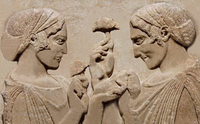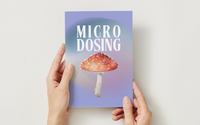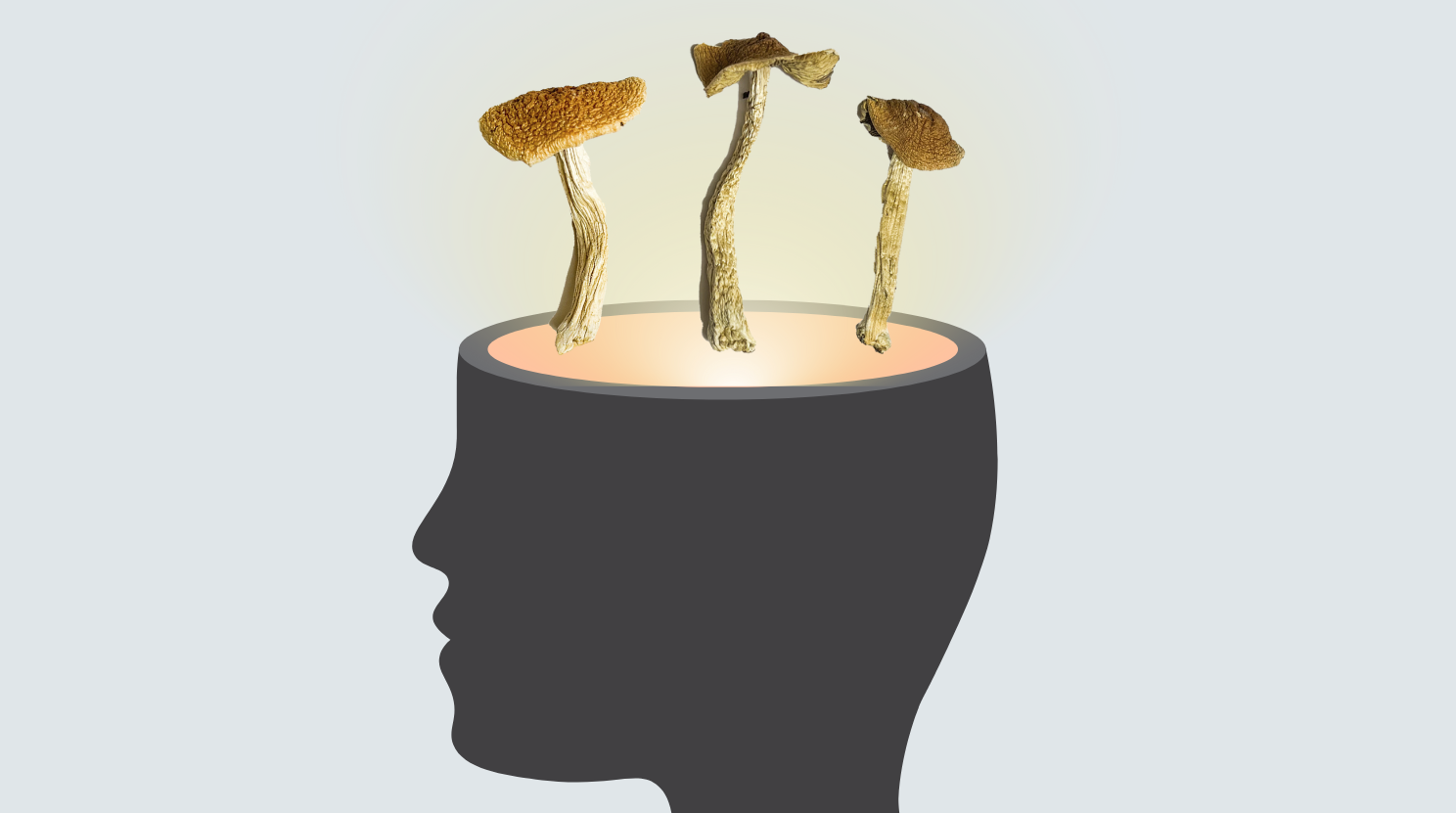Recent posts
-

-
 Amanita Muscaria Microdosing Guide: Safe Dosage, Benefits & MoreBy Psyched WellnessFebruary 17, 2025
Amanita Muscaria Microdosing Guide: Safe Dosage, Benefits & MoreBy Psyched WellnessFebruary 17, 2025
Featured articles
Microdosing Shrooms: How Psilocybin Mushrooms Enhance Mental Health

Thanks to its growing popularity, microdosing is making its way into mainstream conversations and use. As people become increasingly interested in taking charge of their health to enhance wellbeing or creativity, microdosing represents a natural means of harnessing these goals. While many natural or alternative health or wellness trends sometimes lack robust scholarly studies to support their use, this is not the case with microdosing. A growing body of scientific research suggests that those who experiment with microdosing largely have very positive, safe experiences.
Research from the Global Drug Survey indicates that microdosers experience very few adverse effects but enjoy diverse benefits such as enhanced mood, creativity, focus and sociability. While microdosers may use diverse psychedelic and non-psychedelic substances, psilocybin mushrooms (sometimes more colloquially referred to as ‘shrooms') are one of the most popular substances used in microdosing regimens.
What is Microdosing Shrooms?
Microdosing can be defined as the practice of regularly consuming very low doses of psychedelic or psychoactive substances. While opinions differ on the exact dose of a microdose, it can range from one tenth to one twentieth of a typical recreational dose. The purpose of a microdose is to elicit sub-threshold effects. In simple terms, this means that the individual doesn’t feel high or incapacitated from the dose, but they can harness its therapeutic or recreational effects in a subtle yet meaningful way. Microdosing is not typically associated with dramatic alterations to cognition, behavior, perception, or emotions, unlike a typical psychedelic journey.
Microdosing shrooms represents one of the most popular methods of microdosing. Shrooms refer to mushrooms that contain a chemical called psilocybin. When shrooms containing psilocybin are consumed, the body converts the chemical into psilocin, a compound with psychoactive properties. Many people microdose psilocybin mushrooms for mental health, as the practise has been linked to a diverse array of effects, such as improved mood and increased open mindedness.
Interestingly, as many as 50% of people who microdose with shrooms combine them with another substance, a trend known as stacking. Microdosing shrooms with Lion’s Mane mushrooms represents one popular example of this. Users believe that the combination of psilocybin and Lion’s Mane can enhance focus and alleviate symptoms associated with depression.
Microdosing Shrooms for Mental Health
Psilocybin is referred to as a serotonergic psychedelic because it impacts on the body’s serotonin receptor 2A. Serotonin is a neurotransmitter that the nervous system uses to carry messages between brain cells and muscle cells. Serotonin influences diverse processes in the body, including behavior, mood, memory, and digestive health. Although serotonin receptors are located throughout the brain, they’re found in higher levels in the cerebral cortex, which is responsible for diverse cognitive functions such as perception, thought, language skills and memory.
Evidence is accumulating to support the use of microdosing shrooms as a means of managing anxiety and depression. Unlike standard doses of psilocybin, which can trigger intense psychedelic journeys and sometimes even exacerbate anxiety, microdosing offers a much more nuanced, gentle experience.
A 2021 study published in Scientific Reports found that microdosers with mental health concerns showed lower levels of depression, anxiety and stress than non-users. The study also found that health and wellness were prominent motivations for microdosing. A 2022 review on psychedelic microdosing found that microdoses of psychedelic substances, including psilocybin mushrooms, yielded diverse benefits for mental health by improving mood, increasing focus, and enhancing daily function. A 2024 study also found that psilocybin enhanced fear extinction and suppressed fear renewal long after the drug had been administered. According to the authors, serotonin receptors played a critical role in psilocybin’s effects.
How to Start Microdosing Shrooms
When it comes to dosing, a microdose of a psychedelic substance can be considered as between one-tenth and one-twentieth of a standard dose. If you’re thinking about microdosing (dried) psilocybin mushrooms, that equates to about 0.1–0.4 grams. According to James Fadiman, psychedelic research pioneer, and the “father of microdosing”, who has been collecting field reports from thousands of people for well over a decade. a correct microdose produces no classic psychedelic effects such as visual distortions or internal visions. In a 2019 study Fadiman co-authored in The Journal of Psychoactive Drugs, he shares this behavioral definition of a microdose from a participant in his research:
“Feeling productive, able to focus on what I choose, enjoying relationships, good energy, and not recalling that I took anything.”
Fadiman’s studies into people’s diverse microdosing experiences informed his development of a systematic approach to microdosing that has become known as The Fadiman Protocol.
The Fadiman Protocol suggests one day of dosing followed by two rest days, then repeating the process for approximately one month. Following this month, a reset period is observed before starting a new dosing period if desired. Fadiman explains in his research that this protocol developed from early reports microdosers shared with him that suggested that microdosing had a two-day effect. The third day of no dosing was designed to allow people to return to their base state so when they dosed again on the fourth day, they could observe the effects better.
Even though a number of states in the US have decriminalized or legalized psilocybin mushrooms, it can still be challenging–and even dangerous– sourcing shrooms for personal use. Those who choose to forage for psilocybin mushrooms can easily confuse them with poisonous mushrooms that also cause hallucinogenic effects. Similarly, purchasing mushrooms from unknown sources carries risks. If you’re interested in sourcing quality shrooms for microdosing and live in a place where psilocybin is legal like Oregon, it can be advantageous to talk to a professional. If you’re keen on finding your shrooms in the wild, seek out the guidance of an expert forager.
Science Behind Microdosing Shrooms
Psilocybin mushrooms activate serotonin receptors in the brain in a disorganized way. This disorganization can be beneficial as it contributes to the open-minded, creative thought processes that people frequently experience when microdosing with shrooms. Microdosers may additionally experience heightened awareness of their surroundings and subtle shifts in mood, along with other cognitive and perceptual changes.
This unrestrained, open-minded thinking is triggered by decreased activity and connectivity in the brain’s default mode network. The default mode network (DMN) is a system of interconnected parts of the brain that are responsible for processes such as daydreaming, contemplating oneself or others, or thinking about the past and future. Increased integration across the brain may also play a role in reducing the importance of the ego, or diminishing the perception that the self is separate and distinctive from others, thereby contributing to greater feelings of connectedness, contentedness, and enhanced relationships.
A recent 2022 systematic review of 44 studies of microdosing yielded some interesting findings regarding microdosing benefits. Microdosing can alter one’s perception of time, diminish feelings of pain, positively impact mental health, reduce use of addictive substances, reduce mind wandering, provide insights, increase connectedness to nature, enhance wellbeing, increase creativity, improve mood, enhance social connection, improve cognition, elevate emotional processing, and uplift energy.
Interestingly, James Fadiman also observes that many people who continue to microdose after their first month choose to do so less frequently, dropping their dosing days down to once a week or even once a month. Other studies echo this finding, suggesting that psilocybin mushrooms are not addiction-forming.
Potential Risks and Side Effects
Research generally suggests that microdosing is safe and hasn’t been linked to any serious adverse effects, although many studies emphasize that there is a need for more clinical, longitudinal studies to better understand how it may impact people in the long-term.
One study that specifically assessed the safety of microdosing found that a regimen of six low doses taken at four-day intervals was well-tolerated, with participants experiencing few adverse events or concerning changes in vital signs or blood markers. When it comes to microdosing psilocybin specifically, there’s no known evidence that psilocybin cultivates dependency. Some light side effects have been linked to microdosing, however, such as jitteriness, headaches, or anxiety.
Some individuals also mention that microdosing can fail to meet expectations. Those who approach microdosing with high expectations about microdosing’s potential benefits sometimes find that their experiences don’t quite align with their hopes. It’s important to remember that microdosing is about microdoses. This may sound obvious, but start with ultra low doses, go slowly, and observe how your body reacts. You can alway adjust your microdose if needed.
If you’re thinking about embracing a microdosing regimen, it’s definitely a good idea to talk to an informed physician who can ensure that you have no health conditions that may preclude you from experimenting with microdosing.
Many people have embraced microdosing as a means of promoting wellness or addressing health issues There’s a growing body of evidence to support microdosing benefits: microdosing psilocybin mushrooms can enhance wellbeing, boost cognition, elevate creativity, and address symptoms associated with diverse mental health disorders. For people who wish to avoid or wean themselves off conventional medication, psilocybin mushrooms may offer specific benefits for people with depression or anxiety.
Although diverse studies endorse the safety and utility of psilocybin as a therapeutic substance, it is illegal at a federal level. Psilocybin is classified as a Schedule I drug on the Drug Enforcement Agency’s controlled substances list. If you’d like to experiment with microdosing psilocybin mushrooms, it’s vital to find a trusted, safe, expert source to help you plan your regimen.
Psilocybin mushrooms are not freely accessible for purchase, and foraging for your own can be fraught with danger as they’re easy to confuse with highly toxic fungi. If you live in a state where psilocybin has been decriminalized or legalized, it’s a good idea to seek out the help and support of a professional to source shrooms for you.
*This article is for educational purposes only. We are not providing any medical advice and strongly suggest that you speak with your doctor before trying any new products.



